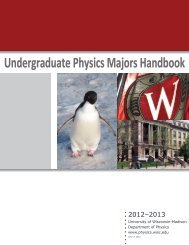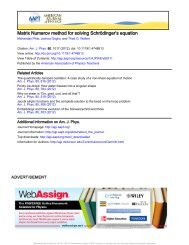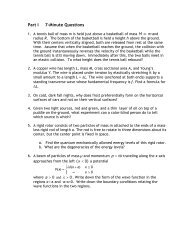Grad Student handbook - Department of Physics - University of ...
Grad Student handbook - Department of Physics - University of ...
Grad Student handbook - Department of Physics - University of ...
Create successful ePaper yourself
Turn your PDF publications into a flip-book with our unique Google optimized e-Paper software.
Ph.D. candidates are required to take five core courses: <strong>Physics</strong> 711 (Dynamics), 715<br />
(Statistical Mechanics), 721 (Electrodynamics) and 731 & 732 (Quantum Mechanics), .<br />
Each course must be repeated until a grade <strong>of</strong> at least a B is earned. (See Appendix B<br />
for the suggested sequence <strong>of</strong> core courses.) Most entering students take two <strong>of</strong> these<br />
core courses in the fall semester and two in the spring semester. All core courses must<br />
be completed by the end <strong>of</strong> the fourth semester <strong>of</strong> the student’s program. Evaluations <strong>of</strong><br />
physics graduate level courses are on file in the <strong>Physics</strong> <strong>Department</strong> Administration Office<br />
(Room 2320B Chamberlin Hall).<br />
Waivers <strong>of</strong> Core Courses<br />
Credit earned at another institution in an equivalent graduate level course may be counted<br />
toward the 5-course requirement if approved by the <strong>Grad</strong>uate Program Director. A new<br />
graduate student who believes he or she qualifies for a waiver <strong>of</strong> the course requirement<br />
for a core graduate course must request the waiver form from the <strong>Grad</strong>uate <strong>Student</strong><br />
Coordinator during the first month he or she is enrolled in the graduate program in <strong>Physics</strong>.<br />
Testing Out <strong>of</strong> Core Courses<br />
<strong>Student</strong>s can also demonstrate pr<strong>of</strong>iciency by passing an exam. A new graduate student<br />
who believes that he or she has had graduate level work in a subject comparable to that<br />
in a core course, but who does not clearly qualify for a waiver <strong>of</strong> the course requirement,<br />
has the option <strong>of</strong> testing out <strong>of</strong> the course. This will require passing the exams for the<br />
course at a level which would clearly lead to a grade <strong>of</strong> B or better. Requests to test<br />
out <strong>of</strong> core courses must be made to the <strong>Grad</strong>uate Program Director during the student’s<br />
first month in the graduate program in <strong>Physics</strong>. The testing must be completed during the<br />
student’s first semester in the graduate program.<br />
Other Courses to Consider<br />
Entering graduate students should check that their undergraduate work was equivalent to<br />
a complete physics major. <strong>Student</strong>s without the experience <strong>of</strong> a senior advanced laboratory<br />
course should consider <strong>Physics</strong> 507. <strong>Physics</strong> 623 (Electronic Aids to Measurement) and<br />
625 (Applied Optics) are important for an understanding <strong>of</strong> experiments in most research<br />
areas and should be taken as soon as possible. The remaining 500 and 600 level courses in<br />
the student’s area <strong>of</strong> interest should also be taken as early as possible.<br />
<strong>Physics</strong> 551 (Condensed Matter <strong>Physics</strong>) should be taken by students interested in<br />
Condensed Matter <strong>Physics</strong> or related areas such as spectroscopy. <strong>Student</strong>s interested<br />
in space physics or astrophysics should take courses in astrophysics which are at least<br />
equivalent to the requirements for a minor in Astronomy. <strong>Physics</strong> 545 (Introduction to<br />
Atomic Structure) gives a good general introduction to atomic physics. Those interested in<br />
plasma physics should begin the sequence <strong>of</strong> plasma courses with <strong>Physics</strong> 525 (Introduction<br />
to Plasmas). <strong>Physics</strong> 535 (Introduction to High Energy <strong>Physics</strong>) and /or <strong>Physics</strong> 735 (Particle<br />
<strong>Physics</strong>) should be taken by students interested in high energy physics.<br />
All graduate students are required to attend the weekly colloquium, <strong>Physics</strong> 900. <strong>Student</strong>s are<br />
also expected to regularly attend at least one <strong>of</strong> the weekly research seminars numbered above<br />
900.<br />
12 | Handbook for <strong>Grad</strong>uate <strong>Student</strong>s in <strong>Physics</strong> 10142011


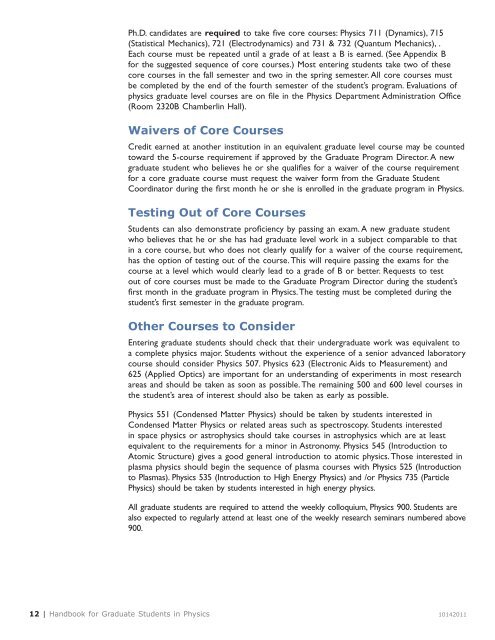
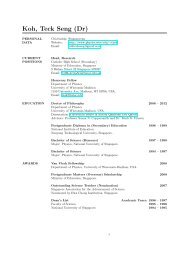
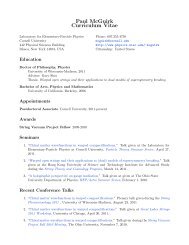
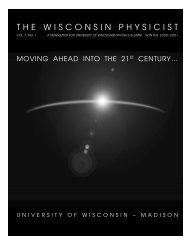
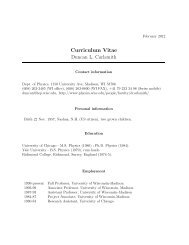

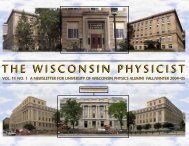
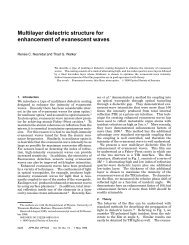
![The Symmetric Linear Potential [ ]](https://img.yumpu.com/25329322/1/190x245/the-symmetric-linear-potential-.jpg?quality=85)

